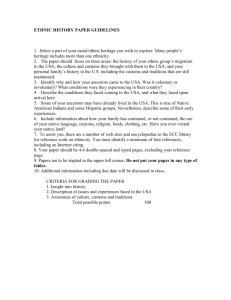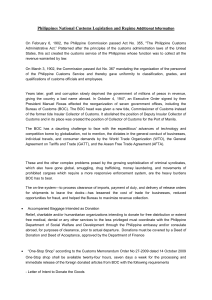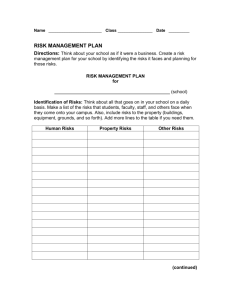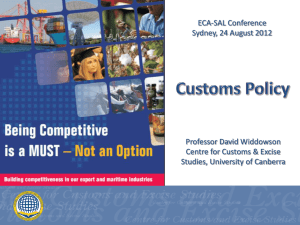REPUBLIC ACT No. 1937 AN ACT TO REVISE AND CODIFY THE
advertisement
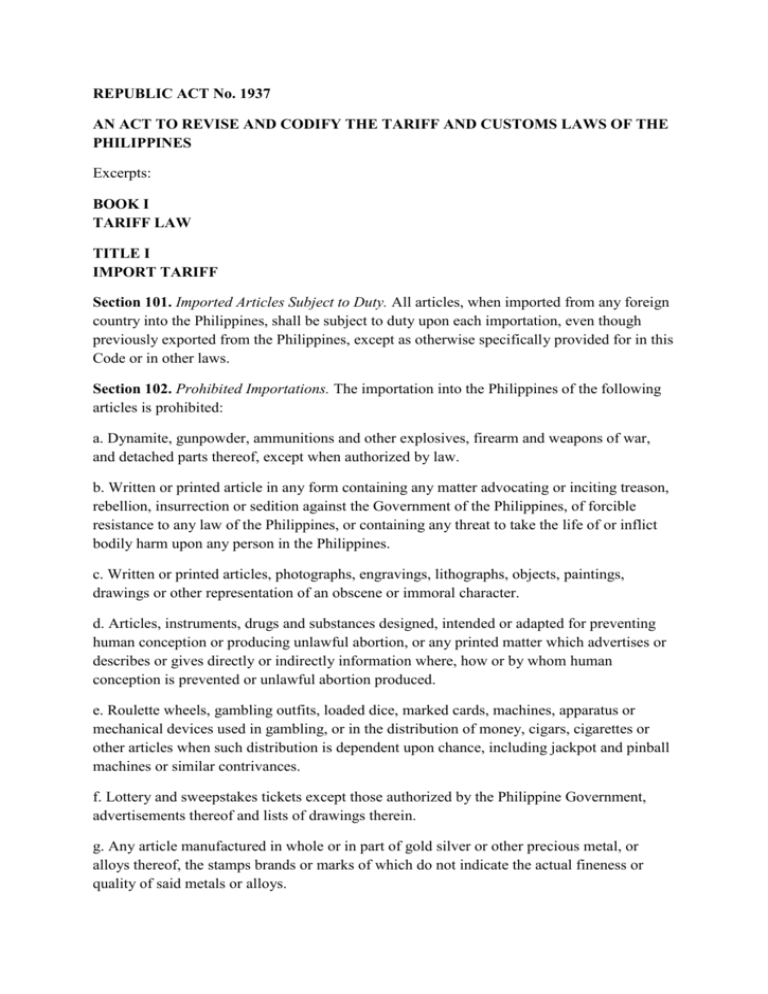
REPUBLIC ACT No. 1937 AN ACT TO REVISE AND CODIFY THE TARIFF AND CUSTOMS LAWS OF THE PHILIPPINES Excerpts: BOOK I TARIFF LAW TITLE I IMPORT TARIFF Section 101. Imported Articles Subject to Duty. All articles, when imported from any foreign country into the Philippines, shall be subject to duty upon each importation, even though previously exported from the Philippines, except as otherwise specifically provided for in this Code or in other laws. Section 102. Prohibited Importations. The importation into the Philippines of the following articles is prohibited: a. Dynamite, gunpowder, ammunitions and other explosives, firearm and weapons of war, and detached parts thereof, except when authorized by law. b. Written or printed article in any form containing any matter advocating or inciting treason, rebellion, insurrection or sedition against the Government of the Philippines, of forcible resistance to any law of the Philippines, or containing any threat to take the life of or inflict bodily harm upon any person in the Philippines. c. Written or printed articles, photographs, engravings, lithographs, objects, paintings, drawings or other representation of an obscene or immoral character. d. Articles, instruments, drugs and substances designed, intended or adapted for preventing human conception or producing unlawful abortion, or any printed matter which advertises or describes or gives directly or indirectly information where, how or by whom human conception is prevented or unlawful abortion produced. e. Roulette wheels, gambling outfits, loaded dice, marked cards, machines, apparatus or mechanical devices used in gambling, or in the distribution of money, cigars, cigarettes or other articles when such distribution is dependent upon chance, including jackpot and pinball machines or similar contrivances. f. Lottery and sweepstakes tickets except those authorized by the Philippine Government, advertisements thereof and lists of drawings therein. g. Any article manufactured in whole or in part of gold silver or other precious metal, or alloys thereof, the stamps brands or marks of which do not indicate the actual fineness or quality of said metals or alloys. h. Any adulterated or misbranded article of food or any adulterated or misbranded drug in violation of the provisions of the "Food and Drugs Act." i. Marihuana, opium poppies, coca leaves, or any other narcotics or synthetic drugs which are or may hereafter be declared habit forming by the President of the Philippines, any compound, manufactured salt, derivative, or preparation thereof, except when imported by the Government of the Philippines or any person duly authorized by the Collector of Internal Revenue, for medicinal purposes only. j. Opium pipes and parts thereof, of whatever material. k. All other articles the importation of which is prohibited by law. … Section 601. Chief Officials of Bureau of Customs. The Bureau of Customs shall have one chief and one assistant chief, to be known respectively at the Commissioner (hereinafter known as the "Commissioner") and Assistant Commissioner of Customs, who shall each receive an annual compensation in accordance with the rates prescribed by existing laws. The Assistant Commissioner of Customs shall be appointed by the proper department head. Section 602. Functions of the Bureau. The general duties, powers and jurisdiction of the bureau shall include: a. The assessment and collection of the lawful revenues from imported articles and all other dues, fees, charges, fines and penalties accruing under the tariff and customs laws. b. The prevention and suppression of smuggling and other frauds upon the customs. c. The supervision and control over the entrance and clearance of vessels and aircraft engaged in foreign commerce. d. The general supervision, control and regulation of vessels engaged in the carrying of passengers and freight or in towage in coastwise trade and in the bays and rivers of the Philippines. e. The prohibition and suppression of unnecessary noises, such as explosion of gasoline engines, the excessive blowing of whistles or sirens, and other needless and disturbing sounds made by water craft in the ports of the Philippines or in parts of rivers included in such ports. f. The exclusion, if the conditions of traffic should at any time so require, of vessels of more than one hundred and fifty tons from entering, berthing or mooring in the Pasig River. g. The admeasurement, registration, documenting and licensing of vessels built or owned in the Philippines, the recording of sales, transfers and incumbrances of such vessels, and the performance of all the duties pertaining to marine registry. h. The inspection of Philippine vessels, and supervision over the safety and sanitation of such vessels. i. The enforcement of the lawful quarantine regulations for vessels entering Philippine ports. j. The enforcement of the tariff and customs laws and all other laws, rules and regulations relating to the tariff and customs administration. k. The licensing of marine officers who have qualified in the examination required by law to be carried on Philippine vessels, the determination of the qualifications of pilots, the regulation of this service, and the fixing of the fees which they may charge. l. The supervision and control over the handling of foreign mails arriving in the Philippines, for the purpose of the collection of the lawful duty on dutiable articles thus imported and the prevention of smuggling through the medium of such mails. Section 603. Territorial Jurisdiction. For the due and effective exercise of the powers conferred by law and to the extent requisite therefor, said bureau shall have the right of supervision and police authority over all seas within the jurisdiction of the Philippines and over all coasts, ports, airports, harbors, bays, rivers and inland waters navigable from the sea. When a vessel becomes subject to seizure by reason of an act done in Philippine waters in violation of the tariff and customs laws, a pursuit of such vessel begun within the jurisdictional waters may continue beyond the maritime zone, and the vessel may be seized on the high sea. Imported articles which may be subject to seizure for violation of the tariff and customs laws may be pursued in their transportation in the Philippines by land, water or air and such jurisdiction exerted over it at any place therein as may be necessary for the due enforcement of the law. Section 604. Jurisdiction over Premises Used for Customs Purposes. The Bureau of Customs shall, for customs purposes, have exclusive control, direction and management of customhouses, warehouses, offices, wharves, and other premises in the respective ports of entry, in all cases without prejudice to the general police powers of the city or municipality wherein such premises are situated. Section 605. Enforcement of Port Regulation of Bureau of Quarantine. Customs officials and employees shall cooperate with the quarantine authorities in the enforcement of the port quarantine regulations promulgated by the Bureau of Quarantine and shall give effect to the same in so far as they are connected with matters of shipping and navigation. … Section 1003. Quarantine Certificate for Incoming Vessel. Entry of a vessel from a foreign port or place outside of the Philippines shall not be permitted until it has obtained a quarantine certificate issued by the Bureau of Quarantine. … Section 1104. Report of Arrival. The pilot in command of any aircraft arriving from a foreign port or place shall immediately report his arrival to the Collector at the airport of entry or to the customs official detailed to meet the aircraft at the place of landing. Such aircraft upon arrival shall be boarded by the quarantine official and after pratique is granted shall be boarded by customs official, and no person shall be permitted to board or leave the aircraft without the permission of the customs official in charge. The pilot in command or any other authorized agent of the owner or operator of the aircraft shall make the necessary entry. No such aircraft shall without previous permission therefor from the Collector, depart from the place of first landing or discharge articles, passengers or baggage. … Section 1207. Jurisdiction of Collector Over Articles of Prohibited Importation. Where articles are of prohibited importation or subject to importation only upon conditions prescribed by law, it shall be the duty of the Collector to exercise such jurisdiction in respect thereto as will prevent importation or otherwise secure compliance with all legal requirements. … TITLE VI ADMINISTRATIVE AND JUDICIAL PROCEEDINGS PART 1. SEARCH, SEIZURE AND ARREST Section 2201. Obstruction of Customs Premises. No person shall obstruct a customhouse, warehouse, office, wharf, street or other premises under the control of the Bureau of Customs, or any of the approaches to such house or premises. Section 2202. Special Surveillance for Protection of Customs Revenue and Prevention of Smuggling. In order to prevent smuggling and to secure the collection of the legal duties, taxes and other charges, the customs service shall exercise surveillance over the coast, beginning when a vessel or aircraft enters Philippine territory and concluding when the article imported therein has been legally passed through the customhouse. Section 2203. Persons Having Police Authority. For the enforcement of the customs and tariff laws, the following persons are authorized to effect searches, seizures and arrests comformably with the provisions of said laws: a. Officials of the Bureau of Customs, collectors, assistant collectors, deputy collectors, surveyors, security and secret-service agents, inspectors, port patrol officers and guards of the Bureau of Customs. b. Officers of the Philippine Navy when authorized by the Commissioner. c. Any person especially authorized in writing by the Commissioner. d. Officers generally empowered by law to effect arrests and execute processes of courts, when acting under direction of the Collector. e. Any person especially authorized by a Collector, subject to the restrictions stated in the next succeeding section. Persons exercising the powers hereinabove conferred shall, in the exercise thereof, have the same authority, be entitled to the proper protection, and shall be governed by the same law, not inconsistent with the provisions of this section, as other officers exercising police authority in general. Section 2204. Place Where Authority May Be Exercised. Persons acting under authority conferred pursuant to subsection (e) of the preceding section may exercise their authority within the limits of the collection district only and in or upon the particular vessel or aircraft, or in the particular place, or in respect to the particular article specified in the appointment. All such appointments shall be in writing, and the original shall be filed in the customhouse of the district where made. All other persons exercising the powers hereinabove conferred may exercise the same at any place within the jurisdiction of the Bureau of Customs. Section 2205. Exercise of Power of Seizure and Arrest. It shall be within the power of a customs official or person authorized as aforesaid, and it shall be his duty, to make seizure of any vessel, aircraft, cargo, articles, animal or other movable property when the same is subject to forfeiture or liable for any fine imposed under customs and tariff laws, and also to arrest any person subject to arrest for violation of any customs and tariff laws, such power to be exercised in conformity with the law and the provisions of this Code. Section 2206. Duty of Officer or Official to Disclose Official Character. It shall be the duty of any person exercising authority as aforesaid, upon being questioned at the time of the exercise thereof, to make known his official character as an officer or official of the Government, and if his authority is derived from special authorization in writing to exhibit the same for inspection, if demanded. Section 2207. Authority to Require Assistance. Any person exercising police authority under the customs and tariff laws may demand assistance of any police officer when such assistance shall be necessary to effect any search, seizure or arrest which may be lawfully made or attempted by him. It shall be the duty of any police officer upon whom such requisition is made to give such lawful assistance in the matter as may be required. Section 2208. Right of Police Officer to Enter Inclosure. For the more effective discharge of his official duties, any person exercising the powers herein conferred, may at anytime enter, pass through, or search any land or inclosure or any warehouse, store or other building, not being a dwelling house. A warehouse, store or other building or inclosure used for the keeping of storage of articles does not become a dwelling house within the meaning hereof merely by reason of the fact that a person employed as watchman lives in the place, nor will the fact that his family stays there with him alter the case. Section 2209. Search of Dwelling House. A dwelling house may be entered and searched only upon warrant issued by a judge or justice of the peace, upon sworn application showing probable case and particularly describing the place to be searched and person or thing to be seized. Section 2210. Right to Search Vessels or Aircrafts and Persons or Articles Conveyed Therein. It shall be lawful for any official or person exercising police authority under the provisions of this Code to go abroad any vessel or aircraft within the limits of any collection to go aboard any vessel or aircraft within the limits of any collection district, and to inspect, search and examine said vessel or aircraft and any trunk, package, box or envelope on board, and to search any person on board the said vessel or aircraft and to this end to hail and stop such vessel or aircraft if under way, to use all necessary force to compel compliance; and if it shall appear that any breach or violation of the customs and tariff laws of the Philippines has been committed, whereby or in consequence of which such vessels or aircrafts, or the article, or any part thereof, on board of or imported by such vessel or aircraft, is liable to forfeiture, to make seizure of the same or any part thereof. The power of search hereinabove given shall extend to the removal of any false bottom, partition, bulkhead or other obstruction, so far as may be necessary to enable the officer to discover whether any dutiable or forfeitable articles may be concealed therein. No proceeding herein shall give rise to any claim for the damage thereby caused to article or vessel or aircraft. Section 2211. Right to Search Vehicles, Beasts and Persons. It shall also be lawful for a person exercising authority as aforesaid to open and examine any box, trunk, envelope or other container, wherever found where he has reasonable cause to suspect the presence therein of dutiable or prohibited article or articles introduced into the Philippines contrary to law, and likewise to stop, search and examine any vehicle, beast or person reasonably suspected of holding or conveying such article as aforesaid. Section 2212. Search of Persons Arriving From Foreign Countries. All persons coming into the Philippines from foreign countries shall be liable to detention and search by the customs authorities under such regulations as may be prescribed relative thereto. Female inspectors may be employed for the examination and search of persons of their own sex. … Section 2520. Bringing of Unmanifested Arms, Explosives or War Equipment. Any vessel or aircraft arriving at a port in the Philippines, having firearms, gunpowder, cartridges, dynamite or any other explosives, munitions or equipments of war concealed on board his vessel or not contained in the manifest of the vessel or aircraft, shall be fined not exceeding twenty thousand pesos. … Section 2530. Property Subject to Forfeiture Under Tariff and Customs Laws. Any vessel or aircraft, cargo, articles and other objects shall, under the following conditions, be subject to forfeiture: a. Any vessel or aircraft, including cargo, which shall be used lawfully in the importation or exportation of articles into or from any Philippine port or place except a port of entry; and any vessel which, being of less than thirty tons capacity shall be used in the importation of articles into any Philippine port or place except into a port of the Sulu sea where importation in such vessel may be authorized by the Commissioner, with the approval of the department head. b. Any vessel engaging in the coastwise trade which shall have on board any article of foreign growth, product or manufacture in excess of the amount necessary for sea stores, without such article having been properly entered or legally imported. c. Any vessel or aircraft into which shall be transferred cargo unladen contrary to law prior to the arrival of the importing vessel or aircraft at her port of destination. d. Any part of the cargo of a vessel or aircraft arriving from a foreign port which is unladen before arrival at the vessel's or aircraft's port of destination and without authority from the proper customs official; but such cargo shall not be forfeited if such unlading was due to accident, stress of weather or other necessity and is subsequently approved by the Collector. e. Any article which is fraudulently concealed in or removed from any public or private warehouse under customs supervision. f. Any article of prohibited importation or exportation, the importation or exportation of which is effected or attempted contrary to law, and all other articles which, in the opinion of the Collector, have been used, are or were intended to be used as instrument in the importation or exportation of the former. g. Unmanifested article found on any vessel or aircraft, if manifest therefor is required. h. Sea stores or stores for aircraft adjudged by the Collector to be excessive, when the duties assessed by the Collector thereon are not paid or secured forthwith upon assessment of the same. i. Any package of imported article which is found by the examining official to contain any article not specified in the invoice or entry, including all other packages purportedly containing imported articles similar to those declared in the invoice or entry to be the contents of the misdeclared package, provided the Collector is of the opinion that the misdeclaration was caused with fraudulent intent. j. Boxes, cases, trunks, envelopes and other containers of whatever character used as receptacles or as devices to conceal article which is itself subject to forfeiture under the customs and tariff laws or which is so designed as to conceal the character of such article. k. Any beast actually being used for the conveyance of article subject to forfeiture under the customs and tariff laws with its equipage or trappings, and any vehicles similarly used, together with its equipage and appurtenances, including the beast, team or other motive power drawing or propelling the same; but the forfeiture shall not be effected if it is established that the owner of the means of conveyance used as aforesaid or his agent in charge thereof at the time, has no knowledge of the unlawful act. l. Any money or thing of value offered as a bribe or for the purpose of exerting improper influence over a customs official or employee. m. Any article sought to be imported or exported: (1) Without going through a customhouse, whether the act was consummated, frustrated or attempted; (2) By failure to mention to a customs official, articles found in the baggage of a person arriving from abroad. (3) On the strength of a false declaration or affidavit executed by the owner, importer, exporter or consignee concerning the importation or exportation of such article. (4) On the strength of a false invoice or other document executed by the owner, importer, exporter or consignee concerning the importation or exportation of such article. (5) Through any other fraudulent practice or device by means of which such articles was entered through a customhouse to the prejudice of the government. … Section 2608. Disposition of Articles Unfit for Use or Sale or Injurious to Public Health. When any article, which in the opinion of the Collector, is a menace to public health, is seized or otherwise comes into the custody of the Bureau of Customs, the Collector of the port shall, if the matter is not disposable under the provisions relating to food and drugs, appoint a board of three members to examine the article. Whenever possible, one member shall be a representative of the Bureau of Health or the local health officer, and the two others shall be responsible officials of the Bureau of Customs, at least one of whom shall be an appraiser. Such board shall examine said article, and if the same is found to be unfit or a menace to the public health, the board shall so report in writing to the Collector, who shall forthwith order its destruction in such manner as the case may require. Health authorities at port of entry shall collaborate with the collectors in such matters with reasonable dispatch. Section 2609. Disposition of Contraband. Articles of prohibited importation or exportation, known as contraband, shall, in the absence of special provision, be dealt with as follows: a. If the article in question is highly dangerous to be kept or handled, it shall forthwith be destroyed. b. Contraband coin or bullion shall accrue to the Stabilization Fund of the Central Bank subject to the payment of the expenses incident to seizure, including the reward to the informer, if any. c. Other contraband of commercial value and capable of legitimate use may be sold under such restrictions as will insure its use for legitimate purposes only; but if the thing is unfit for use or the Collector is of the opinion that, if sold it would be used for unlawful purposes, it may be destroyed in such manner as the Collector shall direct. … PART 3. PENAL PROVISIONS. Section 3601. Unlawful Importation. Any person who shall fraudulently import or bring into the Philippines, or assist in so doing, any article, contrary to law, or shall receive, conceal, buy, sell, or in any manner facilitate the transportation, concealment, or sale of such article after importation, knowing the same to have been imported contrary to law, shall be punished by a fine of not less than six hundred pesos nor more than five thousand pesos and imprisonment for not less than six months nor more than two years and, if the offender is an alien, he shall be deported after serving the sentence. When, upon trial for a violation of this section, the defendant is shown to have or to have had possession of the article in question, such possession shall be deemed sufficient evidence to authorize conviction, unless the defendant shall explain the possession to the satisfaction of the court.


